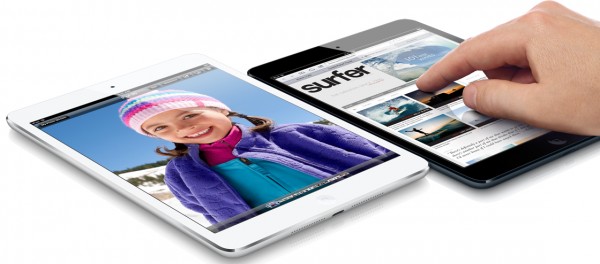So this is WHY Apple risks so much on iPad mini

Apple has a big problem. Android tablets are making huge market share gains against iPad, in part driven by attractive and affordable smaller models like Amazon's Kindle Fire and Google Nexus 7. The Cupertino, Calif.-based company won't admit the reason, but other things said, or even unsaid, during yesterday's earnings conference call reveal much.
Then there is the sudden slowdown in iPad sales taken against new analyst data showing Android device increases. iPad mini is a desperate attempt to stop Apple's bleeding market share, and the cost will hit company margins.
iPad Stumbles
During third quarter, iOS share of the tablet market fell to 56.7 percent from 64.5 percent a year earlier, according to Strategy Analytics. Meanwhile, Android surged to 41.3 percent from 29.2 percent.
"Apple shipped a disappointing 14.0 million iPads worldwide", Peter King, Strategy Analytics director, says. Android global tablet shipments reached 10.4 million units.
"No single Android vendor comes close to Apple in volume terms at the moment, but the collective weight of dozens of hardware partners, such as Asus, Samsung and Nook, is helping Google’s Android platform to register a growing presence in tablets", Neil Mawston, Strategy Analytics executive director, says. That collective weight is crushing.
On Tuesday, Apple unveiled iPad mini, with a shocking surprise. CEO Tim Cook revealed that about two weeks earlier, the company sold its 100 millionth iPad. That tidbit sent many financial analysts scrambling, since the milestone meant that most iPad shipment forecasts were way to high. The eventual 14 million fell as many as 4 million units below some financial analysts estimates. Sequentially, iPad shipments fell 18 percent, as did revenue.
Other data reveals iPad's rapidly disintegrating market position. According to Pew, Americans buy more Android tablets than ever before, dramatically chopping iPad's huge market share lead in just one year. Based on an August survey, iPad market share slipped to 52 percent from 81 percent a year earlier. Twenty-five percent of US adults have access to a tablet, according to Pew (22 percent as owners, 3 percent sharing with someone else in the household). Sixty-eight percent got their tablet within the last year, and 32 percent during 2012.
Much of the gains come from lower-cost tablets that have more than just price advantage -- they offer compelling benefits. Make no mistake, Apple executives show their concern by their contempt -- going out of their way to diss 7-inch tablets, such as Nexus 7 during the mini's launch. "iPad mini is a fantastic product, it is not a compromise product like the 7 inch tablet, sorry, it is a whole different leap", Cook told financial analysts yesterday.
Margins Call
From the perspective of changing market dynamics, iPad mini is something of a necessity. But there's a problem: The price, as I'll further explain in my next post. Unit sales and revenue rarely align, but for iPad both fell 18 percent during third quarter. That says something about declining selling prices, and falling faster than unit sales.
"The iPad ASP's were down year-over-year in a low double-digit way but this really was reflective of our price reduction on the iPad 2 the stronger dollar and a little bit of change in mix and that's what drove the asp change year-over-year on a sequential basis. iPad ASP's were actually pretty flat", Apple CFO Peter Oppenheimer said during Thursday's earnings conference call.
What he means, without directly saying: $399 iPad 2 sales were brisk -- that despite the third-generation model offering so much higher-resolution display. The point: Price matters more, which is seen also in Android tablets' sudden sales surge. Apple charges too much in a rapidly commoditizing computing segment. Consumers prefer lower-cost tablets, which includes iPad 2.
Enter iPad mini, which starting price is $329. About a year ago, I asked BetaNews readers: "What price would be low enough for you to buy a media tablet?" Among the 2,929 respondents so far, 82.21 percent responded $299 or below, with 26.66 percent saying $199 and 51.38 percent $199 or less. Based on the poll, and your responses, Apple has overpriced iPad mini for the mass-market.
But from Apple's perspective, iPad mini sells for too little. "Its gross margin is significantly below the corporate average", Oppenheimer says. "So in summary, we expect our gross margin to decline by about 400 basis points sequentially". Stated differently, Apple expects gross margins to fall from 40 percent to 36 percent quarter on quarter, with iPad being one of the major drivers (along with several simultaneous product launches).
It's a funny turn of events. In June, IDC raised iPad's forecast market share to 62.5 percent from 58.2 percent and lowered Android tablets to 36.5 percent from 38.7 percent. The analyst firm may want to revisit and reduce iPad shipment projections.
Tom Mainelli, IDC research director, said then that "if Apple launches a sub-$300, 7-inch product into the market later this year as rumored, we expect the company’s grip on this market to become even stronger".
Except it's not sub $300 but ranges from $329 to $659. Every iPad mini sold helps to preserve Apple's tablet market share, while sapping margins. The point: If consumers continue to flock to lower-cost tablets, Apple loses. If they choose sub-$300 models, competitors win. If consumers buy iPad mini, Apple margins decline.